The Centres
The nine personality types of the Enneagram can be arranged into three groups called the Triads or the Centres.
Each Centre of the Enneagram describes the main imbalances that exist in each personality type. The personality types in the thinking centre are not necessarily more intelligent than the other types. Instead, these types actually lack true connection to their inner knowledge and guidance. Their personalities try to compensate for this lack of inner guidance by using mental strategies. The same pattern exists with the types in all the centres.
The three centres refer to the three centers or sources of human intelligence. Typically, we think of intelligence as a mental faculty. One is intelligent because one can understand and solve problems. However, this source of intelligence is not the only way in which one can truly know something.
The heart is also a source of intelligence. Through the heart we connect with our feelings and the emotions of others. We can understand what others feel and value through our feelings and values. The love and values we recognize in ourselves and in others leads to an understanding of our identity and that of others.
The third source of intelligence is our body's intelligence: our instinct. Instinct is the expression of the body's energy and vitality, how we assert our will into the world around us.
The Heart Centre (Types 2,3,4)
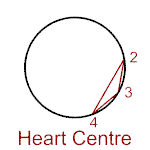
The types in the Heart Centre have gifts and issues involving their emotions. When they are healthy and balanced, their use of emotion is constructive and especially beneficial to their relationships. When they are unhealthy, their emotions become imbalanced.
The essential qualities of this centre involve the deep connection with the intelligence of the heart. The heart is our source of feelings and emotional connection with others. It helps us recognize our love and value for ourselves and for others. Through feelings and value we understand our identity, who we (and others) really are.
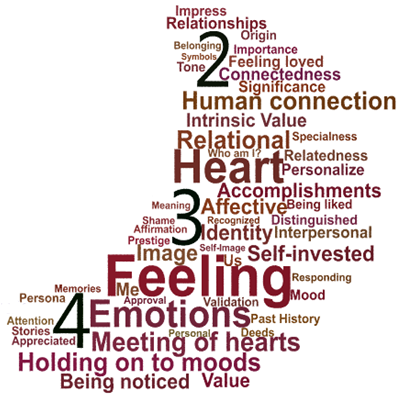
At some point in their development, Twos, Threes, and Fours feel that they have lost these essential qualities -- that they have lost contact with their value and with their identity. They adopt a false belief that they are worthless, leading to an underlying feeling of shame.
To compensate, the personality tries to create and maintain a personal identity that will overcome these feelings. This self-image is based on memories and interpretations from their past. By identifying with this self-image, they create a false sense of value. Twos, Threes, and Fours spend a great deal of energy seeking validation from others to affirm this self-image.
Unfortunately, others do not always recognize or pay enough attention to the self-image. As a result, Twos, Threes, and Fours may begin to experience their underlying feelings of shame. They may become hostile with others and express hatred of those who don't value them. Another problem is that by focusing exclusively on their created persona, they must reject some aspects of their true nature. For whatever reason, these aspects must remain hidden from others (and from themselves) because they are associated with qualities that render them worthless.
The Two in the Heart Centre
Twos tend to project a self-image of a caring, nurturing, friendly helper. They tend to over express their feelings, focusing on the positive emotions, while repressing the negative ones. Their self-image is directed outward trying to get others to like them. Generally, Twos accomplish this task by being kind and giving to others and expecting others to validate and appreciate them. Twos are trying to earn attention: by being kind and loving others, others will be kind and loving in return. Twos can maintain their "all-good" self-image by rejecting what they see as their "negative" qualities. They also minimize their own needs so they can focus on meeting the needs of others.
Sometimes the Two gets into the situation where they are not needed. Since Twos get their worth from helping others (they need to be needed), they will still try to find ways to help others, even if it really isn't required. With the best of intentions, Twos can start to become intrusive and meddlesome and try to make others dependent on them.
The Three in the Heart Centre
Threes tend to project a self-image of the winner, someone who embodies the values of their community. Threes have a hard time getting in touch with their feelings -- they tend to push their feelings aside to make favourable impressions and to function efficiently and productively. Like Twos, Threes focus their self-image outward: because they desperately want the approval of others. Threes are always aware of what's important to others and they also focus their self-image inward to shape and adapt their persona to better match what is expected of them. Also, like Twos, Threes reject their authentic self in favour of a more valued identity. If Threes do not get the attention they demand from others, they are likely to promote themselves and their accomplishments (perhaps exaggerating or becoming untruthful). Increased levels of shame may erupt as hostility by insulting others and putting them down to (temporarily) feel superior.
The Four in the Heart Centre
Fours tend to project a self-image of a mysterious, special, and unique individual. Fours under express their feelings, preferring indirect methods to share and communicate what they feel. Fours spend a great deal of energy directing their self-image inward. Fours are seeking their true identity and are trying to make sure that it is based on their inner feelings and imagination. Fours reject many of their positive qualities and common characteristics that they share with others (it's hard to be unique if you are like others). Fours seek attention through withdrawal (which may at first seem like a contradiction). Fours withdraw to pull others in (especially into their inner world). They want others to notice their depth of character and to obtain sympathy for what they feel is their unjust suffering. Fours believe that Life has dealt them a bad hand and their underlying feeling of shame may lead to hostility against Life (despair). In addition, they may feel hostility at their parents (or others in their past), themselves (for being defective), and at others (for not recognizing how special the Four is).
The Head Centre (Types 5,6,7)
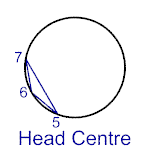
The types in the Head Centre have gifts and issues involving their thinking. When they are healthy and balanced, they have incredible keen insights and ideas. When they are unhealthy, their thinking becomes imbalanced.
The essential qualities of this centre involve the deep connection with the intelligence of the mind. The gifts of the mind include the ability to observe, perceive, and effortlessly understand. The mind also provides us with confidence and inner guidance.
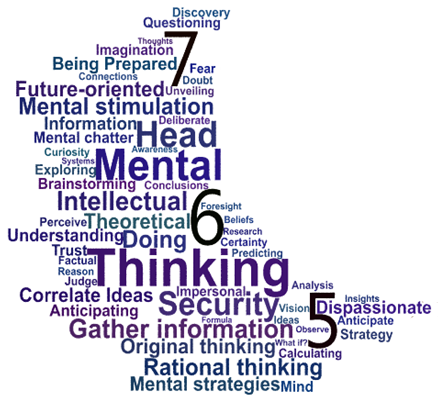
At some point in their development, Fives, Sixes, and Sevens feel that they have lost these essential qualities -- that they have lost contact with their inner guidance. They adopt a false belief that they have no inner support or confidence, leading to underlying feelings of fear and anxiety. They see the world as a threatening and uncertain place.
To compensate, Fives, Sixes, and Sevens become very motivated to find sources of security and confidence. They try to anticipate and prepare for the future. They spend their time trying to find and maintain a sense of inner guidance and support. These types pursue mental strategies and/or belief systems to create a false sense of security against anxiety.
Unfortunately, they do not always feel they have the security they need to combat their fear. As a result, their insecurity and anxiety increase. They seek methods to decrease their anxiety. They tend to be wary of authority and are generally cautious with relationships. They dislike uncertainty and want to be prepared for it, but have difficulty with closure.
The Five in the Head Centre
Fives tend to over express their thinking and substitute thinking for doing. Fives see the world as threatening and uncertain so they focus their thinking inward, hoping to understand it. Fives believe if they sufficiently study the world, they will understand it. Once they understand it, they will have the confidence to act and cope with the outer world. Unfortunately Fives get stuck in an "analysis paralysis" where every answer they generate raises more questions, which they must answer. Like the other members of this Centre, Fives seek security. Because they feel the world is very uncertain, Fives withdraw to feel secure. They retreat into their minds to understand the world around them, removing themselves from directly observing that which fears them. Unfortunately, this strategy generates even more fear. By removing themselves from the world, they are less able to participate -- the best path to understanding.
The Six in the Head Centre
Sixes have a hard time getting in touch with their thinking and inner guidance. Like Fives, they focus their thinking inward to avoid external threats, but they have serious doubts about their own abilities. Consequently, they seek reassurance and confirmation outside themselves. However, Sixes may start to doubt their authority figures, resulting in a vacillating between their own ideas and those of others. Sixes seek security by finding something (or someone) in which to believe. By having a clear set of rules or beliefs, Sixes will gain confidence to cope with life. Sixes feel they must earn their security. They believe if they do their part for the authority, it will take care of them. Sixes are constantly aware of their anxiety and always react against it. Sometimes, they rely on their authority to allay their fears, sometimes they will courageously confront their fears directly.
The Seven in the Head Centre
Sevens tend to under express their thinking and substitute doing for thinking. Sevens see their inner world as threatening; issues of sadness, loss, and grief cause great anxiety. Sevens avoid dealing with these issues by fleeing their inner world and trying to keep preoccupied with the outer world. As a result, they focus their thinking outward, keeping their mind busy with new plans and ideas. Their anxiety is repressed through constant activity, and by concentrating on positive expectations, ideas, and plans. Like Fives and Sixes, Sevens are also seeking security, but they are unsure where to find it. Sevens feel that they have to try all sources of security and that way they'll eliminate the ones that don't work and find the ones that do. Sevens however, have a hard time focusing on the sources of security they presently have. Instead, they are always thinking about the future. Keeping their options open, Sevens try not to over commit themselves to any one thing, lest they miss out on an even better experience.
The Body Centre (Types 8,9,1)
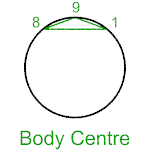
The types in the Body Centre have gifts and issues involving their instinct. When they are healthy and balanced, they have strong relational skills with others and their environment. When they are unhealthy, their relationship skills become imbalanced.
The essential qualities of this Centre involves the deep connection with the intelligence of the body, their instinct. Instinct is a type of knowledge that is not often recognized. Our instincts involve our sense of vitality and assertion. Instinct involves our inner wants and our ability to assert them in a way that is consistent and harmonious with the world around us.
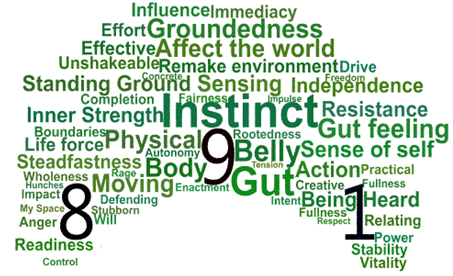
At some point in their development, Eights, Nines, and Ones feel that they have lost these essential qualities -- that they have no sense of self and that they cannot assert their wants. Being unable to express themselves leads to an underlying feeling of rage.
To compensate, the personality tries to create and maintain a sense of self, where they are free to influence the world, but not be influenced by it. Consequently, the types in the Body Centre are motivated to find ways to feel autonomous and independent. One way to feel a sense of self is to carry tension in our bodies. Another is to create boundaries around us.
Unfortunately, when Eights, Nines, and Ones do not get the autonomy that they seek, their underlying feelings of rage rise up. They may become aggressive (in a way, proving their independence). They way become resistant to change, again to bolster feelings of autonomy.
The Eight in the Body Centre
Eights over express their instinct. They act upon whatever gut hunches and powerful impulse arise. They feel that autonomy will come if they assert their wants aggressively and if they resist being influenced. They must remain in control. Eights extend their sphere of influence to include their families, their home, their workplace, etc. These expansive boundaries help them to feel substantial and immortal. They may become confrontational to feel their boundaries. They also repress their gentler, emotional side because it is seen as vulnerable. Ironically, Eights repress these instinctual qualities.
The Nine in the Body Centre
Nines are out of touch with their instinctual drives. Nines believe that expressing their views or asserting their needs will cause conflict or lack of harmony. Nines shut down most of their instincts by repressing and denying their own wants and needs. Nines try to maintain their autonomy by resisting change (both external pressures and passionate feelings). Nines often accommodate and go with the flow (in a sense giving up their independence), but they do so with the agreement to give the Nine her own space to do her own thing. If they don't get that space, their underlying rage may come out in passive-aggressive forms.
The One in the Body Centre
Ones under express their instinct. Ones repress their inner wants and instincts with a strict superego-driven conscience. They resist their own feelings and wants through self-control (an inner boundary). Ones can maintain their autonomy by being perfect -- being above criticism. They also seek autonomy from their own feelings and wants. When Ones feel that they are losing their autonomy, their rage and aggression is directed inward through harsh self-criticism. Sometimes, they lose self-control and have outbursts of anger towards others.





